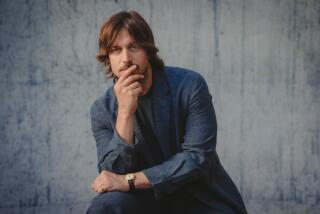Classic Hollywood: Marlon Brando’s private audiotapes tell the story of a man haunted by memories
“Listen to me, Marlon... This is one part of yourself speaking to another part of yourself. Listen to the sound of my voice and trust me. You know I have your interests at heart.”
— Excerpt from a self-hypnosis tape recorded in 1996 by Marlon Brando
By any measure, Marlon Brando was one of the most influential actors in the history of cinema.
His powerful acting style and undeniable charisma have mesmerized generations of filmgoers, with unforgettable roles in such movies as “On the Waterfront,” “A Streetcar Named Desire” and “The Godfather.” A generation of American actors studied — if not actually copied — his every move on-screen. He was like no one else.
NEVER MISS A CLASSIC HOLLYWOOD STORY: Sign up for our free weekly newsletter >>
But a new documentary, “Listen to Me Marlon,” which opens July 31 and will run this year on Showtime, shows another side of Brando — a man haunted by memories of an alcoholic mother and abusive father, who lacked self-esteem, battled loneliness and struggled through personal tragedies, including the suicide of his daughter Cheyenne and the killing of her lover by Brando’s son Christian, for which he pleaded guilty to voluntary manslaughter.
“Listen to Me Marlon” is told in the late Brando’s own voice, culled from some 300 hours of audiotapes the actor made over the decades. Interspersed between excerpts from the tapes are clips from his films, historical footage and a ghostly, unsettling digitalized version of Brando created from digital scans made in the 1980s by a friend, VFX supervisor Scott Billups. A facsimile of rooms from his now-demolished estate on Mulholland Drive were even built for the production.
The documentary’s British director, Stevan Riley (“Everything or Nothing”), believes Brando was a “prisoner of his own fame.”
“He was trapped,” the director added, “but I am not entirely sure he would have relinquished the fame if given the choice.”
When Riley began listening to a handful of the tapes, he said he thought, “‘What if the entire story was told in Brando’s own words?’ It was a bit of a shot in the dark.”
British producer John Battsek (“Searching for Sugar Man”) said audiences will be able to hear Brando struggling with himself and recognizing his own flaws on the tapes.
“He wasn’t a bad man, but he made a mess of so many things,” Battsek said. “He knew he was making a mess. He was so critical of himself, but he couldn’t stop himself.”
Avra Douglas, a trustee of the Brando estate who worked for the actor for several years and was a family friend, acknowledged: “We weren’t sure that the entire story could be told through Marlon’s voice.... Stevan figured out a way to tell the story without having talking heads, as one usually sees in documentaries.”
The result, she noted, is quite an emotional experience, especially for “people who knew him, to hear his voice.”
Battsek said Brando’s daughter Rebecca walked out of the first screening at Sundance, where it debuted this year. “I went out to find her and she was sitting outside, sobbing her eyes out because it was too emotional and difficult. She was sitting in the company of her father for the first time in a decade and watching and listening to him go through the travails of his life.”
A few years ago, representatives of the Brando estate decided it was time for a new documentary about the actor, who died in 2004 at age 80. “There were a few that kind of scratched the surface,” said Douglas. “It was the idea of reintroducing him to a newer generation of people who didn’t know much about him or maybe had only heard of ‘The Godfather.” ’
Brando started recording his thoughts “as soon as he could get his hands on a tape recorder,” Douglas said, adding that he loved new technology and gadgets. “He was the first person to buy a Mac. He was the first person to tell me about the Internet. I had no idea what he was talking about.”
Battsek flew to “Los Angeles very swiftly” when asked if he had interest in doing the film. “I met with [the estate] and started to talk about what could we do that would feel innovative and progressive. If they wanted a puff piece, then we weren’t the right people.”
Though Douglas said “there were some personal things we kept private,” Battsek and Riley had access to most material in the archive, including the hundreds of hours of audio recordings.
Brando had recorded his thoughts and musings on reel-to-reel tape, regular cassettes and mini-cassettes, and other material was on CD.
Listening to the tapes, Riley said, he realized that Brando not only suffered from a deep loneliness but also, “I think he had something resembling an attachment disorder.”
“He admits in the film to be incredibly jealous,” Riley added. “I think he had issues of abandonment with his mother and his nanny. He was still trying to chase his father’s love, even at the end. He was the archetype man-child.”
NEVER MISS A CLASSIC HOLLYWOOD STORY: Sign up for our free weekly newsletter >>
------------
Marlon Brando, in his own voice
On his childhood:
“We lived in a small town, and my mother was the town drunk. When my mother was missing, gone someplace, we didn’t know where she was. I used to have to go and get her out of jail. Memories, even now, that fill me with shame and anger.”
On the Broadway production of “A Streetcar Named Desire”
“There’s nothing about me that’s like Stanley Kowalski. I hate that kind of guy. I absolutely hate that person, and I couldn’t identify with it. The brute, dark character that represented the beasts and the animals.”
On acting:
“If I hadn’t had the good luck to be an actor, I don’t know what I would have been. I would probably have been a con man. A good con man. Tell smooth lies, give impressions of things that he thinks or appears to think that he doesn’t think.”
On fame:
“Most actors want to get their name in the paper. They like all that attention. I very often am struck with the illusion of success. Sometimes it’s difficult when you meet people, because you see that they’ve prejudged you. Not to be treated normally. To have people staring at you, like an animal in the zoo. What it does is remove you from reality.”
MORE CLASSIC HOLLYWOOD
PHOTOS: Behind the scene photos of classic Hollywood
Memories of Bob Hope, ‘Animal House’ and Marlon Brando
TCM Classic Film Festival: Oscar winners discuss making of ‘Gunga Din’
For more Classic Hollywood, follow us on Facebook and subscribe to the newsletter
More to Read
Only good movies
Get the Indie Focus newsletter, Mark Olsen's weekly guide to the world of cinema.
You may occasionally receive promotional content from the Los Angeles Times.









